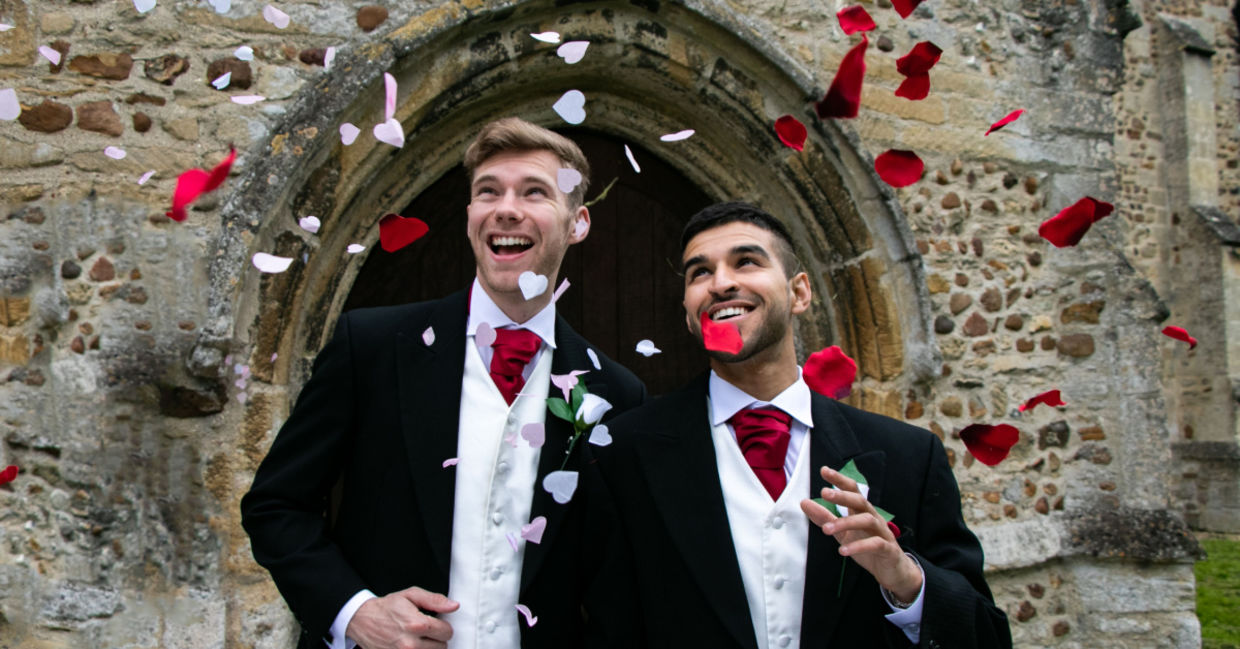
(Tony Marturano / Shutterstock.com)
TIME shared the heartwarming story of Stavros Gavriladis and Dimitrios Elefsiniotis, a couple with three young children, who’ve just celebrated their 20th anniversary of being together. Gavriladis and Elefsiniotis share all the concerns and hopes of a typical family: Are their children happy at school? What will they do to celebrate their loved one’s birthday? Who will make the cake for the bake sale?
But, as an LGBTQ couple in the traditional, Orthodox Christian country of Greece, the couple had some unique dreams and worries: Would they be able to finally tie the knot after 20 years together? And without both dads being legally considered the dads of their kids, they were worried about possible custody issues in case something happened to the family.
However, on February 15th, Gavriladis and Elefsiniotis’s worries were put to bed as the Greek parliament made history, officially legalizing same-sex marriage. Now, the couple has a new set of concerns – planning an exciting, joyous wedding ceremony that was 20-years in the works.
The vote for equal rights
Same-sex marriage passed in a landmark parliamentary bill at the Athens-based parliament after 176 Members of Parliament voted in favor of the measure. The new law received widespread and bipartisan approval, with only 76 voting against it, while two abstained, The Guardian reported.
Parliamentarians from both sides championed the bill. For example, Kyriakos Mitsotakis, the head of the Conservative New Democracy party told detractors in a speech before the vote, that Conservatism didn’t have to mean aligning with antiquated values. He added that the bill would end a “serious inequality for our democracy,” and would help Greece join the family of 36 democratic, open, and equal nations that had already legalized same-sex marriage.
“The reform that we are legislating today …” Mitsotakis explained in the speech, “Will make the life of some of our fellow citizens that much better without – and I emphasize this – taking away anything from the lives of the many.”
Syriza, the left-wing opposition party also lent its support to the bill. Stefanos Kasselakis, the head of Syriza, is himself a member of the LGBTQ community. That’s not to say the bill was unopposed. Many in the right-wing New Democracy party opposed the bill, including Antonis Samaras, the former prime minister. Greece is also a Christian Orthodox nation, and several traditional church officials strongly opposed the law, with some threatening to excommunicate MPs who voted in favor of the law.
Four parties, including the right-wing Spartans party and the left-wing communist KKE party rejected the “monstrous legislation.” The motion took place only after days of debate and critique.
But, in the end, love prevailed, and a consensus of Members of Parliament passed the measure, as Athenians, including members of the LGBT community watched the proceedings and celebrated in the gallery above parliament.
More work to be done
The new law allows same-sex couples to marry and adopt children, but LGBTQ advocates argue that more work is needed. Kasselakis for example described it as “imperfect,” adding that his family hopes to pursue having children through a surrogate, something still illegal in Greece.
Others, like Elena Christidi, a psychologist who founded an advocacy group that works with the LGBTQ community, said that the language in the bill is far from perfect and that the debates before the law passed continued numerous instances of hate speech.
“The legislation itself is so problematic and the language that we have heard so offensive that rather than wanting to celebrate, a lot of people feel quite numb,” Christidi told The Guardian.
“It’s been devastating for gay men and trans people who want to have children … once again they’ve been left with the feeling that the state has judged them not to be good enough to have the same rights as others,” she added.
However, even though gaps remain, overwhelmingly, the LGBTQ community is celebrating the groundbreaking legislation. Gavriliadis told TIME that, “Our suits and wedding rings are already ready. We’ll finally be one family with two surnames,” he added, describing the law as one that “honors freedom, equality, love, our dignity, and ensures the rights of our children.”
YOU MIGHT ALSO LIKE:
5 People Championing Body Positivity in the LGBTQ Community
Stand In Parents are Here to Provide Support
The ‘Rainbow Railroad’ Helps LGBTQ Individuals Escape Persecution







